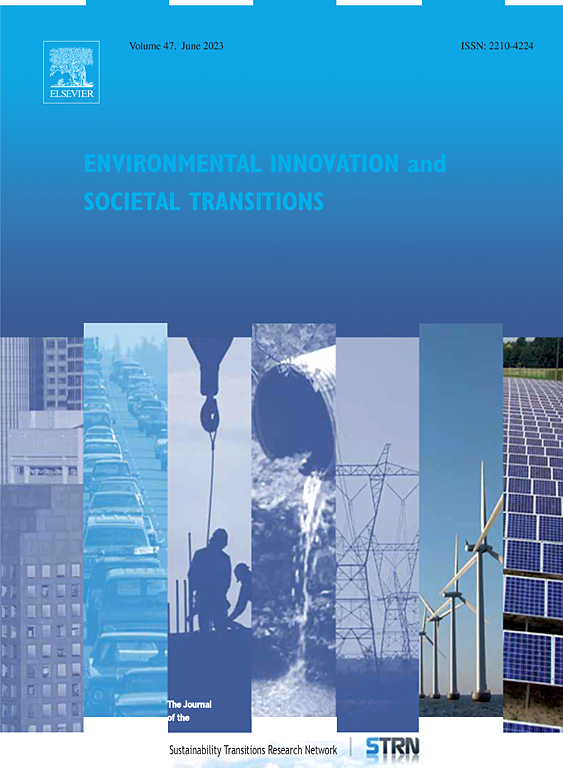学会(不完全)什么都不买:减少消费的数字礼物经济和家庭创新
IF 5.7
2区 经济学
Q1 ENVIRONMENTAL SCIENCES
Environmental Innovation and Societal Transitions
Pub Date : 2024-10-30
DOI:10.1016/j.eist.2024.100929
引用次数: 0
摘要
迅速过渡到可持续的生活模式是一项艰巨的任务,尤其是在个人和家庭层面,根深蒂固的消费和处理系统表现出强烈的路径依赖。本研究探讨了个人和家庭如何通过基层创新促进可持续发展转型。具体来说,我们要问:数字礼品经济如何促进家庭消费习惯的改变,并推动更广泛的可持续转型?为了解决这个问题,我们介绍了一个关于 "什么都不买项目"(BNP)的指导性案例研究,该项目是一个全球规模但以本地为重点的数字礼品经济,是一种在家庭空间中实现公民能动性的草根创新。BNP 是一个由超本地化的数字礼品赠送团体组成的社会技术网络,倡导社区依赖和慷慨解囊,以减少家庭消费和浪费,建立邻里关系。我们的分析表明,BNP 最具革命性的地方在于它所促进的嵌入式日常可持续发展实践,特别是通过团体参与和持续会员制在个人、家庭和社区层面减少消费的社会学习。我们认为,这种草根创新使公民能够在家庭空间中发挥能动作用,为可持续发展转型做出了重大贡献。矛盾的是,这些做法的普通性,加上成员的性别构成,以及获取和处理家庭用品通常被视为 "妇女的工作",可能会阻碍人们认识到 BNP 作为可持续转型的强大催化剂的潜力。这项研究有助于我们了解数字平台如何支持家庭层面的可持续做法创新,并强调了承认和重视对可持续转型做出贡献的各种形式的重要性。本文章由计算机程序翻译,如有差异,请以英文原文为准。
Learning to (not quite) buy nothing: Digital gift economies and household innovations reducing consumption
The daunting task of swiftly transitioning to sustainable modes of living presents a formidable challenge, particularly at individual and household levels, where entrenched consumption and disposal systems exhibit strong path dependency. This research investigates how individuals and households can contribute to sustainability transitions through grassroots innovations. Specifically, we ask: How do digital gift economies facilitate changes in household consumption practices and contribute to broader sustainability transitions? To address this question, we present an instructional case study of the Buy Nothing Project (BNP), a globally scaled yet locally focused digital gift economy, as a grassroots innovation enabling citizen agency within domestic spaces. BNP is a socio-technical network of hyperlocal, digital gift-giving groups that advocate for community reliance and generosity to reduce household consumption and waste and build neighbourhood bonds. Our analysis reveals that BNP's most revolutionary aspect lies in the embedded everyday sustainability practices it facilitates, particularly the social learning to reduce consumption at individual, household, and community levels through group participation and ongoing membership. We argue that this grassroots innovation enables citizen agency within domestic spaces, contributing significantly to sustainability transitions. Paradoxically, the ordinariness of these practices, combined with the gendered composition of members and that acquiring and disposing of household goods is usually considered “women's work”, may hinder recognition of BNP's potential as a powerful catalyst for sustainable transitions. This study contributes to our understanding of how digital platforms can support household-level innovations in sustainability practices and highlights the importance of recognising and valuing diverse forms of contribution to sustainability transitions.
求助全文
通过发布文献求助,成功后即可免费获取论文全文。
去求助
来源期刊

Environmental Innovation and Societal Transitions
Energy-Renewable Energy, Sustainability and the Environment
CiteScore
13.60
自引率
19.40%
发文量
90
审稿时长
56 days
期刊介绍:
Environmental Innovation and Societal Transitions serves as a platform for reporting studies on innovations and socio-economic transitions aimed at fostering an environmentally sustainable economy, thereby addressing structural resource scarcity and environmental challenges, particularly those associated with fossil energy use and climate change. The journal focuses on various forms of innovation, including technological, organizational, economic, institutional, and political, as well as economy-wide and sectoral changes in areas such as energy, transport, agriculture, and water management. It endeavors to tackle complex questions concerning social, economic, behavioral-psychological, and political barriers and opportunities, along with their intricate interactions. With a multidisciplinary approach and methodological openness, the journal welcomes contributions from a wide array of disciplines within the social, environmental, and innovation sciences.
 求助内容:
求助内容: 应助结果提醒方式:
应助结果提醒方式:


